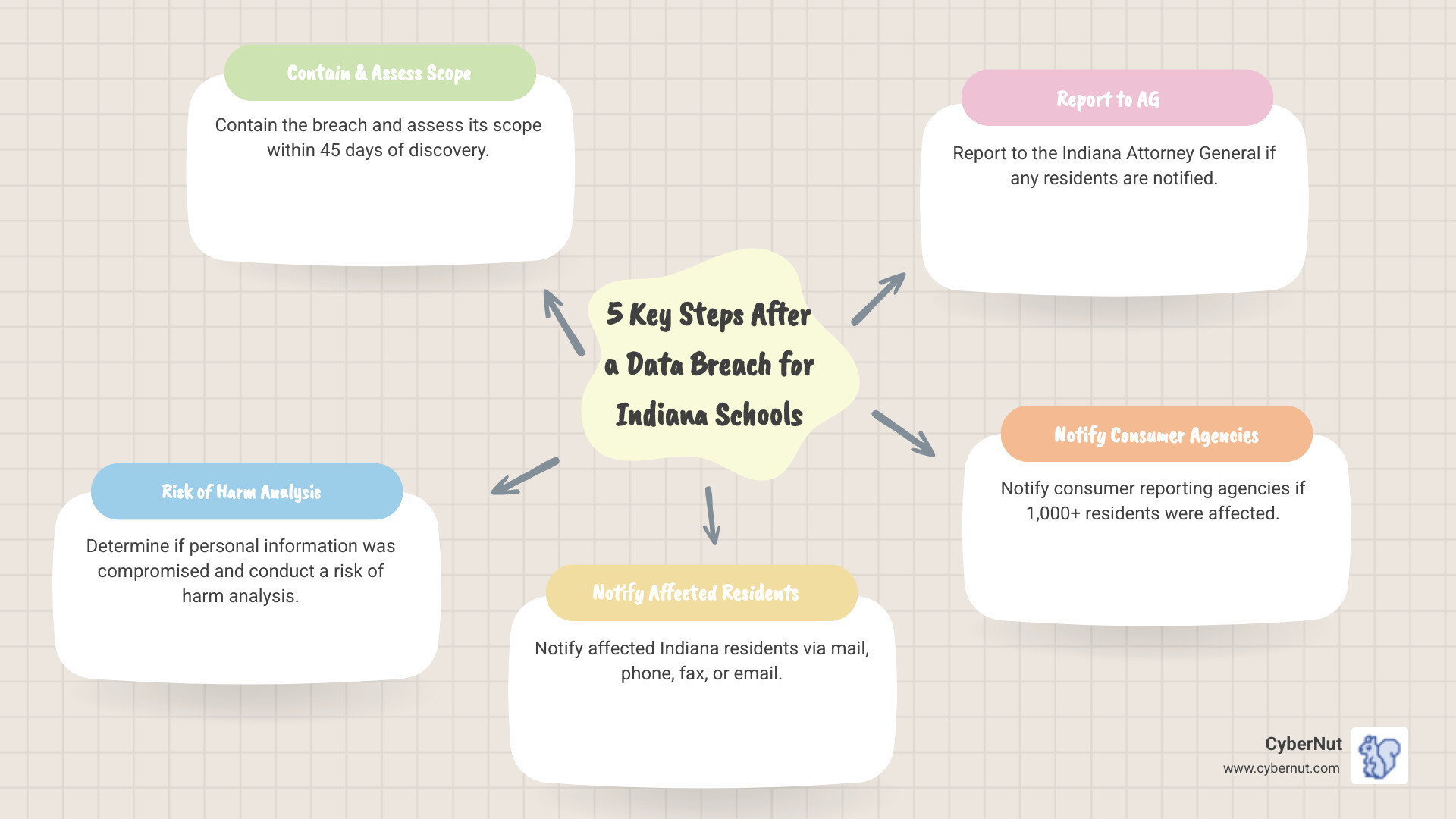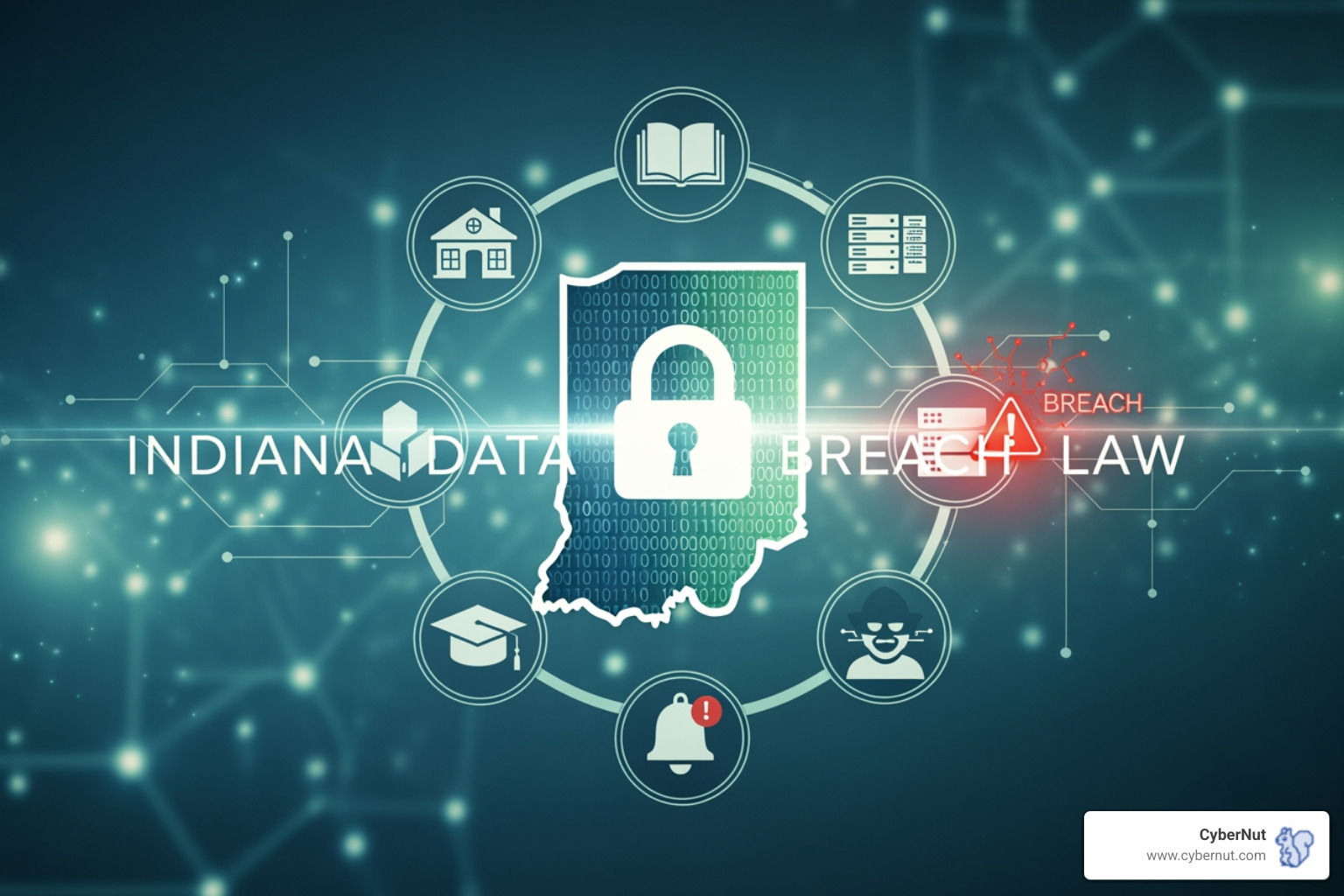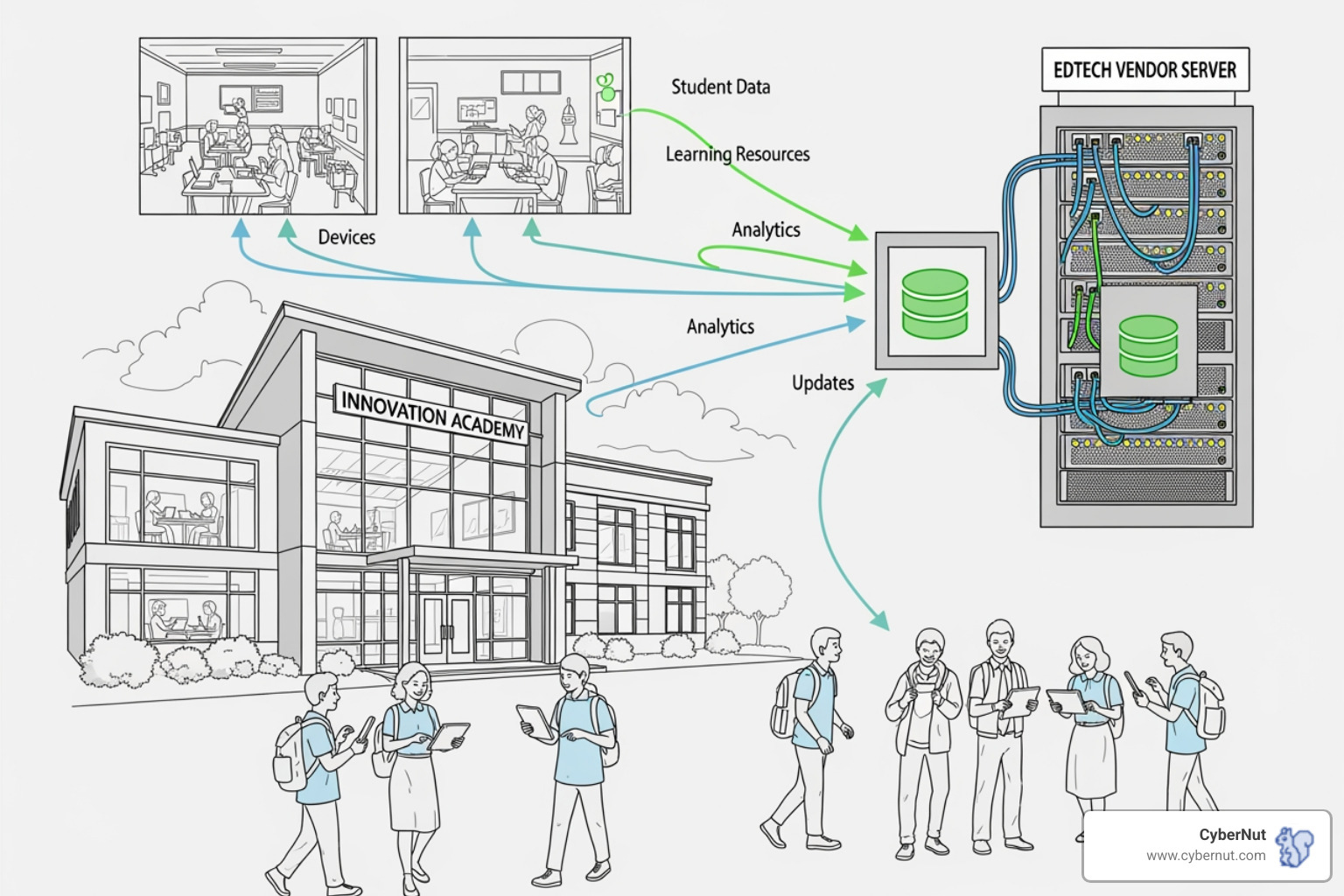
Oliver Page
Case study
November 14, 2025

What to Know About Indiana's Data Breach Notification Law for Schools means understanding your legal obligations when student or staff data is compromised. Indiana Code § 24-4.9 requires schools to act quickly and follow specific procedures to protect families and comply with state law.
Key Requirements at a Glance:
Educational institutions are prime targets for cyberattacks because they store vast amounts of sensitive data. A single phishing email can expose your district to significant legal and financial consequences.
Indiana's law was updated on July 1, 2022, establishing a strict 45-day notification timeline. Before this, the standard was a vague "without unreasonable delay." Since most breaches are found weeks after they occur, the clock is already ticking. You need clear procedures in place before an incident happens.
This guide breaks down what Indiana schools need to know about data breach notification, from defining a breach to managing vendor risks and building a proactive cybersecurity posture.
Want to test your school's vulnerability to the most common attack vector? Get a complimentary phishing audit to see where your staff and students stand.

What to Know About Indiana’s Data Breach Notification Law for Schools terms to learn:
What to Know About Indiana's Data Breach Notification Law for Schools starts with the legal framework governing your response. Indiana's rules come from Ind. Code Ann. § 24-4.9-1 et seq. and the State Agency Law Ind. Code Ann. § 4-1-11 et seq. for public schools.
A critical 2022 update replaced the vague "without unreasonable delay" standard with a concrete 45-day deadline after finding a breach. This clock starts the moment you find the breach, not when your investigation is complete. This change makes proactive data governance and a documented Incident Response Planning in K12 legal necessities.
Understanding these legal definitions is key to determining your notification obligations.
A data breach is the unauthorized acquisition of computerized data that compromises the security of personal information. This includes unencrypted data or encrypted data where the encryption key was also acquired. It can also apply to printed copies of computerized data.
Personal information is an Indiana resident's Social Security number, or their first name (or initial) and last name combined with one of the following:
Schools routinely handle this data for students and staff, making it crucial to understand what qualifies as sensitive. For more details, see our guide on Sensitive Data Definition and Types. Publicly available information is generally exempt, but this rarely applies to school records.
The moment you find a breach, your legal obligations begin. You must notify affected individuals without unreasonable delay, but no later than 45 days after findy.
You may only delay notification to restore your system's integrity, determine the breach's scope, or if requested by law enforcement for an investigation. Once those reasons no longer apply, you must notify promptly.
However, not every incident requires notification. Indiana law allows for a risk of harm analysis. If a thorough investigation concludes the breach is not reasonably likely to result in identity deception, identity theft, or fraud, you may not need to send notifications. This assessment must be carefully documented to justify your decision. Understanding realistic Cybersecurity Risks: Protecting K-12 Schools from Evolving Threats is vital for this analysis.
When in doubt, it is often safer to notify.
Indiana law spells out who to notify, when, and how. Understanding these requirements is your best defense against penalties. A comprehensive Data Security and Privacy Plan should include these steps to provide a clear roadmap.

Your first priority is notifying affected students, parents, and staff within the 45-day window. Accepted methods include written notice by mail, email (with prior consent), or telephone.
Your notice should be clear and actionable, explaining what happened, what information was involved, what you are doing, and what steps individuals can take to protect themselves (e.g., monitoring credit reports). Provide contact information for questions. Transparency is key to maintaining trust with your community. For comparison, see how other states handle this in our guide on What to Know About Georgia's Data Breach Notification Requirements for Schools.
Beyond individuals, you must also inform state authorities.
For very large breaches, Indiana law allows for substitute notice. This is an option if individual notification costs would exceed $250,000 or if the breach affects more than 500,000 residents.
Substitute notice requires a combination of:
This method is a last resort, not a shortcut. You are still responsible for making a good-faith effort to inform everyone affected.
Want to prevent breaches before they happen? Get a complimentary phishing audit to see where your staff and students are most at risk.
Knowing when you don't have to notify is as important as knowing when you do. Indiana's law includes key exceptions, but the penalties for non-compliance are severe. Additionally, schools must manage the risks posed by third-party vendors who handle student data. For more on this, see our guide on Third-Party Data Breaches 101.

Indiana law provides several "safe harbors" that may exempt schools from notification:
The Indiana Attorney General enforces the law strictly. Failure to comply can lead to:
These public enforcement actions can damage your district's budget and reputation. The cost of non-compliance far exceeds the cost of preparation.
Your school is legally responsible for protecting student data, even when it's stored on a vendor's server. While Indiana law requires vendors who experience a breach to notify you, the term "as soon as practicable" can be dangerously vague.
To protect your district, robust vendor management is essential. Your contracts must include:
You need contracts that give you control. For guidance, see our articles on Contract Clauses Every School Should Demand in EdTech Agreements and Beyond Firewalls: How to Secure Data Shared with Third-Party EdTech Vendors. A transparent partnership is critical to meeting your 45-day deadline.
Compliance with What to Know About Indiana's Data Breach Notification Law for Schools is about building a proactive culture of security to protect your community before a breach happens.

This means weaving data protection into every aspect of your operations, from technology infrastructure to staff training. These practices not only help with compliance but also make your school more secure overall.
The best way to handle a data breach is to prevent it. A proactive posture involves strengthening defenses and preparing your team. Key practices include:
Your biggest vulnerability is often human error. Staff training is essential, as most breaches start with a person clicking a phishing email. Effective, ongoing User Training: Pillar in Cybersecurity for School Districts is critical. It must be engaging and reinforced regularly.
CyberNut's automated, gamified micro-trainings make cybersecurity education effective and engaging for busy school staff. For more on building a training program, see A Comprehensive Guide to Cybersecurity Training for Schools in 2025.
Wondering where your school stands? Get a complimentary phishing audit to see how your staff responds to realistic phishing attempts.
Indiana schools must also steer federal laws like the Family Educational Rights and Privacy Act (FERPA). Understanding how they interact is crucial. FERPA protects the privacy of all student education records, while Indiana's law focuses on breach notification for specific personal data. Our guide All About FERPA: The Federal Student Privacy Law That Still Matters in 2025 has more details.
In practice, a single breach can trigger both laws. When state and federal laws overlap, you must follow the stricter rule—in this case, Indiana's specific 45-day deadline. For state agencies, Indiana's Data Protection Law adds another layer. Both laws emphasize prevention, so your strategy must address both privacy (FERPA) and security (Indiana law).
What to Know About Indiana's Data Breach Notification Law for Schools is clear: when a breach occurs, you have a 45-day legal deadline to notify affected individuals and authorities. The penalties for non-compliance, including fines up to $150,000 per violation, are severe.
This guide covered the key requirements, from what triggers notification to managing third-party vendors. However, the best breach response is prevention. A proactive defense, built on a strong security culture, is your greatest asset. This starts with your people, as human error remains a leading cause of breaches.
Continuous staff training on phishing awareness and safe online habits dramatically reduces your school's risk. That's where CyberNut helps. We provide custom, automated, and gamified cybersecurity training designed for K-12 schools. Our engaging micro-trainings fit into busy schedules and empower your staff to become your first line of defense.
Don't wait for a breach to test your defenses. Take proactive steps to protect your community.

Oliver Page

Some more Insigths


Back